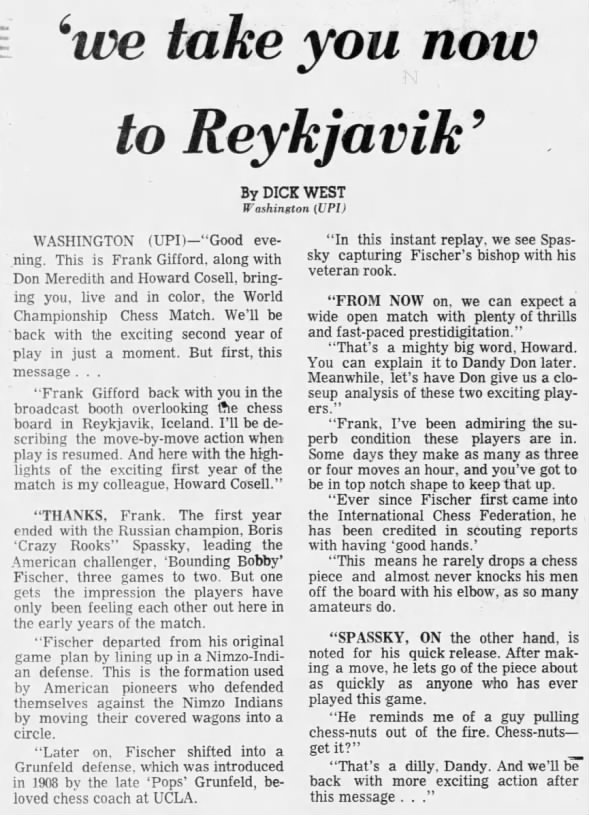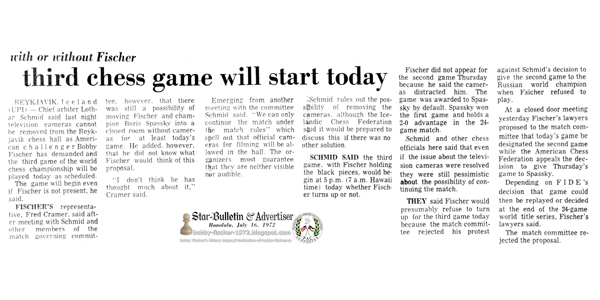Honolulu Star-Bulletin Honolulu, Hawaii Sunday, July 16, 1972 - Page 85
'We Take You Now to Reykjavik'
Washington (UPI) — “Good evening. This is Frank Gifford, along with Don Meredith and Howard Cosell, bringing you, live and in color, the World Championship Chess Match. We'll be back with the exciting second year of play in just a moment. But first, this message…
“Frank Gifford back with you in the broadcast booth overlooking the chess board in Reykjavik, Iceland. I'll be describing the move-by-move action when play is resumed. And here with the highlights of the exciting first year of the match is my colleague, Howard Cosell.”
“Thanks, Frank. The first year ended with the Russian champion, Boris “Crazy Rooks” Spassky, leading the American challenger, ‘Bounding Bobby’ Fischer, three games to two. But one gets the impression the players have only been feeling each other out here in the early years of the match.
“Fischer departed from his original game plan by lining up a Nimzo-Indian defense. This is the formation used by American pioneers who defended themselves against the Nimzo Indians by moving their covered wagons into a circle.
“Later on, Fischer shifted into a Grunfeld defense, which was introduced in 1908 by the late ‘Pops’ Grunfeld, beloved chess coach at UCLA.
“In this instant reply, we see Spassky capturing Fischer's bishop with his veteran rook.
“FROM NOW on, we can expect a wide open match with plenty of thrills and fast-paced prestidigitation.”
“That's a mighty big word, Howard. You can explain it to Dandy Don later. Meanwhile, let's have Don give us a closeup analysis of these two exciting players.”
“Frank, I've been admiring the superb condition these players are in. Some days they make as many as three or four moves an hour, and you've got to be in top notch shape to keep that up.
“Ever since Fischer first came into the International Chess Federation, he has been credited in scouting reports with having ‘good hands.’
“This means he rarely drops a chess piece and almost never knocks his men off the board with his elbow, as so many amateurs do.
“SPASSKY, ON the other hand, is noted for his quick release. After making a move, he lets go of the piece about as quickly as anyone who has ever played this game.
“He reminds me of a guy pulling chess-nuts out of the fire. Chess-nuts—get it?”
“That's a dilly, Dandy. And we'll be back with more exciting action after this message.”
 'We take you now to Reykjavik' 16 Jul 1972, Sun Honolulu Star-Bulletin (Honolulu, Hawaii) Newspapers.com
'We take you now to Reykjavik' 16 Jul 1972, Sun Honolulu Star-Bulletin (Honolulu, Hawaii) Newspapers.com
Honolulu Star-Bulletin Honolulu, Hawaii Sunday, July 16, 1972 - Page 85
Third Chess Game Will Start Today
Reykjavik, Iceland (UPI) — Chief arbiter Lothar Schmid said last night television cameras cannot be removed ([Really?! Is that so? This is no doubt why Robert Fischer called Schmid, a “liar” because according to the man who helped draft the rule, “Under agreed rules of the match, [Fischer] had the right to object and to demand removal of the cameras if they disturbed him.” -Col. Edmund Edmondson, USCF]) from the Reykjavik chess hall as American challenger Bobby Fischer has demanded and the third game of the world chess championship will be played today as scheduled.
The game will begin even if Fischer is not present, he said.
FISCHER'S representative, Fred Cramer, said after meeting Schmid and other members of the match governing committee, however, that there was still a possibility of moving Fischer and champion Boris Spassky into a closed room without cameras for at least today's game. He added, however, that he did not know what Fischer would think of this proposal.
“I don't think he has thought much about it,” Cramer said.
Emerging from another meeting with the committee Schmid said, “We can only continue the match under the match rules” which spell out that official cameras for filming will be allowed in the hall. ([Soviet manipulation of the rules to disrupt the match, is really what is implied here.]) The organizers must guarantee that they are neither visible nor audible. ([And will the camera operators, the men, who come in crews up to three men, will they be “neither visible or audible?”])
Schmid rules out the possibility of removing the cameras, although the Icelandic Chess Federation said it would be prepared to discuss this if there was no other solution.
SCHMID SAID the third game, with Fischer holding the black pieces, would begin at 5 p.m. (7 a.m. Hawaii time) today whether Fischer turns up or not.
Fischer did not appear for the second game Thursday because he said the cameras distracted him. ([No, Robert Fischer said THE MEN OPERATING THE CAMERAS distracted him.]) The game was awarded to Spassky by default. ([Although a verbal protest was lodged preceding the opening of the match by Fischer and valid, written petition of Fischer's grievance was delivered by Fred Cramer to organizers before the deadline.])Spassky won the first game and holds a 2-0 advantage in the 24-game match.
Schmid and other chess officials here said that even if the issue about the television cameras were resolved they were still pessimistic about the possibility of continuing the match.
THEY said Fischer would presumably refuse to turn up for the third game today because the match committee rejected his protest against Schmid's decision to give the second game to the Russian world champion when Fischer refused to play.
At a closed door meeting yesterday Fischer's lawyers proposed to the match committee that today's game be designated the second game while the American Chess Federation appeals the decision to give Thursday's game to Spassky.
Depending on FIDE's decision that game could then be replayed or decided at the end of the 24-game world title series, Fischer's lawyers said.
The match committee rejected the proposal.
Tampa Bay Times St. Petersburg, Florida Sunday, July 16, 1972 - Page 6
Private Spassky-Fischer Chess Match Proposed
Reykjavik (UPI) — In a final attempt to get Bobby Fischer to return to the chess board, the world championship match committee proposed Saturday that Sunday's game in his contest with Russia's Boris Spassky be played privately with only the players and judges present. That way the American challenger would escape the TV cameras in the chess hall. He refused to play the second game Thursday because the organizers would not remove the cameras ([the men operating the cameras]) which he said distracted him.
But Arbiter Lothar Schmid of West Germany and other chess officials said they were still pessimistic about the possibility of continuing the match, in which Spassky leads, 2-0, after beating the American in the first game and winning the second by default. ([So, remove the obstacles created by Soviets such as disruptive camera men and let's see what Fischer is capable of.])
Kingsport Times-News Kingsport, Tennessee Sunday, July 16, 1972 - Page 29
Chess - Isolation May Save Match
Reykjavik (UPI) — In a final attempt to get Bobby Fischer to return to the chess board, the world championship match committee proposed Saturday that Sunday's game in his contest with Russia's Boris Spassky be played private with only the players and judges present.
That way the American challenger would escape the TV cameras in the chess hall. He refused to play the second game Thursday because the organizers would not remove the cameras ([and disruptive crews of men disruptively operating the cameras]) which he said distracted him.
But arbiter Lothar Schmid of West Germany and other chess officials said they were still pessimistic about the possibility of continuing the match, in which Spassky leads, 2-0, after beating the American in the first game and winning the second by default.
They said Fischer would presumably refuse to turn up for the third game Sunday because the match committee rejected his protest against Schmid's ([illegal, since formal protests had been officially declared before the deadline]) decision to give the second game to the Russian world champion when Fischer refused to play.
At a closed door meeting Saturday Fischer's lawyers proposed to the match committee that Sunday's game be designated the second game while the American Chess Federation appeals the decision to give Thursday's game to Spassky to the International Chess Federation (FIDE) Congress at Skopje, Yugoslavia.
Depending on FIDE's decision that game could then be replayed or decided at the end of the 24-game world title series, Fischer's lawyer said.
The match committee rejected the proposal, chess sources said, and reiterated that the clock will be started at 5 p.m. (1 p.m. EDT) Sunday for the third game regardless of whether Fischer turns up.
Schmid said the match rules allow him to move the match, “at least temporarily to give Fischer a chance to calm down,” from the 3,000 seat chess hall to a closed backstage room.
The rules say that any player can request such a move if he is distracted by noise and has more than 20 minutes of his original two and a half hours playing time left on the clock.
The Icelandic Chess Federation, which stands to lose about $100,000 or more if the $250,000 match is called off, ([what? No money actually tucked away “in escrow”?? like legitimate sports organizers would do before offering an $125,000 prize pot?]) said it was prepared to discuss the complete removal of all cameras if no other solution was possible. ([And that's precisely what should have been done when Fischer first raised the issue, “Under agreed RULES of the match, [Fischer] had the RIGHT TO OBJECT and TO DEMAND REMOVAL of the cameras if they disturbed him.” -Edmondson, USCF])
Newsday (Nassau Edition) Hempstead, New York Sunday, July 16, 1972 - Page 122
It's All Just A Game Anyway by Alan E. Pollock
Wouldn't it be a sensible idea if the outcome of the Cold War between the U.S. and the Soviet Union was decided once and for all at the present world championship match between Bobby Fischer and Boris Spassky?
Just think of it. Instead of wasting all those billions of dollars on MIRVs, F-111s and ABMs to keep on par with all the Russian war-toys, we could spend the money for people's real needs.
And with the chess match deciding the future of the world, we wouldn't lose any more men in Indochina attempting to preserve U.S. influence there. Instead Bobby Fischer might sacrifice a few pawns to gain strength on one particular section of the chess board.
And finally by having the chess game decide on our fate, the political leaders of both countries would finally admit to what they have been playing all along—a cruel and senseless “game.”
Come to think of it, even if Fischer did win (so that the U.S. won the Cold War) it wouldn't mean much. We would soon lose the whole shebang to the Chinese in a Ping-Pong match.
- Alan E. Pollock, Sound Beach.
 It's All Just A Game Anyway 16 Jul 1972, Sun Newsday (Nassau Edition) (Hempstead, New York) Newspapers.com
It's All Just A Game Anyway 16 Jul 1972, Sun Newsday (Nassau Edition) (Hempstead, New York) Newspapers.com


























